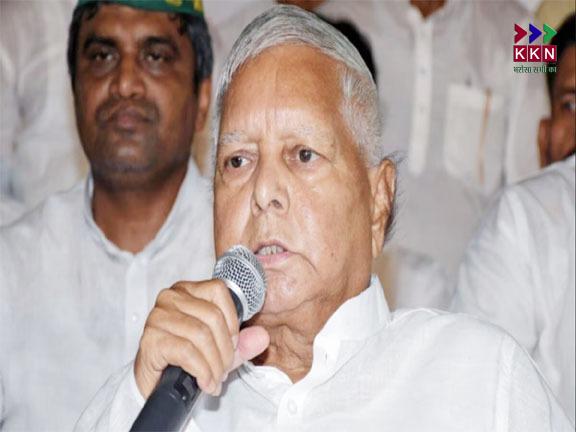
The political atmosphere in Bihar grew tense on Thursday as the NDA’s Bihar Bandh created disruptions across districts, including the capital Patna. The bandh was called in protest against a Congress leader allegedly abusing Prime Minister Narendra Modi’s mother during a public event. While the NDA tried to demonstrate strength on the streets, reports emerged of misbehavior with common citizens at several locations, leading to strong criticism from opposition leaders.
Rashtriya Janata Dal (RJD) president Lalu Prasad Yadav launched a fierce attack on the Bharatiya Janata Party (BJP) and Prime Minister Modi, accusing BJP supporters of misusing the bandh to harass ordinary people. Taking to social media, Lalu Yadav condemned the incidents, calling them shameful and unacceptable.
Lalu Yadav’s Strong Reaction
In his post on X (formerly Twitter), Lalu Yadav questioned whether Prime Minister Narendra Modi had given orders to BJP workers to insult and abuse women during the bandh. He specifically mentioned that Bihar’s women, including mothers, sisters, and daughters, were targeted in abusive language by BJP supporters.
He further warned, “Gujarati people should not take Biharis lightly. This is Bihar.” His words reflected not only anger but also a message of regional pride, underlining Bihar’s cultural sensitivity and strong political identity.
Allegations of Misbehavior During Bandh
According to Lalu Yadav, the Bihar Bandh saw shocking incidents of alleged misconduct by BJP workers. He claimed that women, including pregnant women, female teachers, elderly citizens, girl students, and even journalists, faced abuse and misbehavior at the hands of those enforcing the bandh.
He accused BJP supporters of not only using abusive language but also engaging in physical altercations and harassment, questioning whether such behavior was justified in any way. His statement sought to hold the BJP accountable for the reported incidents, demanding an explanation from both the party and Prime Minister Modi.
Bihar Bandh and Its Wider Impact
The NDA had announced the Bihar Bandh as a show of protest against derogatory remarks directed at Prime Minister Modi’s mother by a Congress leader in Darbhanga. The bandh saw widespread road blockades, traffic disruption, and protests across multiple districts. While it was meant to express political outrage, the alleged instances of harassment drew public anger and divided opinion.
For ordinary citizens, the bandh brought inconvenience and frustration. Office-goers, students, and travelers were stuck in traffic jams, while businesses remained shut in several areas. Reports of violence and misbehavior only added to the chaos, raising questions about the bandh’s real impact.
Political War of Words
The incidents quickly escalated into a heated political war. RJD, as Bihar’s main opposition party, seized the opportunity to criticize BJP and NDA leadership. Lalu Yadav’s social media posts resonated with his supporters, who echoed his sentiments that the bandh had crossed ethical lines.
On the other hand, BJP leaders defended the bandh, insisting it was necessary to protest the insult directed at the Prime Minister’s family. They dismissed Lalu Yadav’s allegations as politically motivated, claiming the opposition was trying to divert attention from the original issue.
Social Media and Public Reaction
Lalu Yadav’s statements circulated widely on social media, sparking debates among political observers and citizens alike. Supporters of RJD shared his posts, condemning the BJP for allegedly turning a political protest into an attack on ordinary people.
At the same time, BJP supporters countered by accusing RJD of exaggerating events and ignoring the provocation that triggered the bandh. This digital battle added fuel to the ongoing street protests, intensifying the political drama.
Questions on Conduct and Responsibility
The Bihar Bandh also reignited discussions about the accountability of political parties during protests. Critics argued that enforcing a bandh should not involve harassment or violence against citizens. Lalu Yadav’s comments brought the focus back to whether NDA leaders had ensured discipline among their cadre.
Civil society voices also questioned whether bandhs should remain a tool of political expression, given the disruption they cause to ordinary lives. For many, the incidents highlighted the growing gap between political battles and public welfare.
Lalu Yadav’s Broader Strategy
Lalu Yadav’s criticism of BJP during the Bihar Bandh fits into his broader political strategy. As RJD president and a veteran leader, he continues to position himself as a defender of Bihar’s dignity and the rights of its people. By focusing on the alleged harassment of women and vulnerable groups, he aimed to strike an emotional chord with voters.
His attack on Prime Minister Modi and BJP leaders also reinforces his attempt to mobilize opposition support ahead of future elections, presenting RJD as a strong counterweight to NDA dominance in the state.
The NDA’s Bihar Bandh, intended as a show of protest against derogatory remarks made about Prime Minister Narendra Modi’s mother, quickly turned into a subject of controversy. Allegations of misbehavior by BJP workers with women, teachers, elderly people, and journalists gave the opposition, particularly RJD, strong ammunition to criticize the ruling alliance.
Lalu Yadav’s fiery remarks on social media not only condemned the incidents but also questioned BJP’s moral authority to lead protests. His words highlighted the tension between political demonstrations and public inconvenience, raising important questions about responsibility and accountability in democratic protests.
As Bihar continues to grapple with political polarization, the Bihar Bandh has added another chapter to the ongoing tussle between NDA and RJD. The debate over whether the protest upheld democratic values or undermined them through misbehavior will likely remain a talking point in Bihar’s political discourse for weeks to come.


